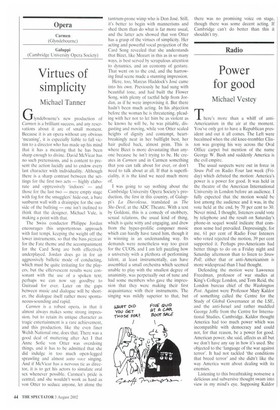Opera
Carmen (Glyndebourne) Galuppi (Cambridge University Opera Society)
Virtues of simplicity
Michael Tanner
Glyndebourne's new production of Carmen is a brilliant success, and any reservations about it are of small moment. Because it is an opera without any obvious 'meaning', it is especially liable to fall victim to a director who has made up his mind that it has a meaning that he has been sharp enough to divine. David McVicar has no such pretensions, and is content to present the action lucidly and to endow every last character with individuality. Although there is a sharp contrast between the settings for the first two acts — highly elaborate and oppressively 'indoors' — and those for the last two — mere empty stage with fog for the smugglers' hide-out, a bare sunburnt wall with a drainpipe for the outside of the bullring — one isn't inclined to think that the designer, Michael Vale, is making a point with that.
The Swiss conductor Philippe Jordan encourages this unportentous approach with fast tempi, keeping the weight off the lower instruments, so that the bass pizzicati for the Fate theme and the accompaniment for the Card Song are both effectively underplayed. Jordan does go in for an aggressively balletic mode of conducting, which must be quite irritating for the players, but the effervescent results were consonant with the use of a spoken text; perhaps we can now say goodbye to Guiraud for ever. Later on the gaps between music and dialogue will be shorter, the dialogue itself rather more spontaneous-sounding and rapid.
Carmen is a robust opera, in that it almost always makes some strong impression, but to retain its unique character as tragic entertainment is a rare achievement, and this production, like the even finer Welsh National one, does that. There was a good deal of muttering after Act I that Anne Sofie von Otter was overdoing things, and it has to be admitted that she did indulge in too much open-legged sprawling and almost sotto voce singing. And if McVicar has a nervous tic as director, it is to get his actors to simulate oral sex whenever possible. Carmen's pride is central, and she wouldn't work as hard as von Otter to seduce anyone, let alone the tantrum-prone wimp who is Don Jose. Still, it's better to begin with mannerisms and shed them than do what is far more usual, and the latter acts showed that von Otter has a grasp of the virtues of simplicity. Her acting and powerful vocal projection of the Card Song revealed that she understands that Bizet, like Mozart in this as in so many ways, is best served by scrupulous attention to dynamics, and an economy of gesture. That went on to the end, and the harrowing final scene made a stunning impression.
Here, too, Marcus Haddock's Jose" came into his own. Previously he had sung with beautiful tone, and had built the Flower Song, with plenty of tactful help from Jordan, as if he were improvising it. But there hadn't been much acting. In his abjection before the woman he is threatening, pleading with her not to let him be as violent as he knows he will be, he was pitiable, disgusting and moving, while von Otter scaled heights of dignity and contempt, heartbreakingly neat in her bullfight best, her hair pulled back, almost prim. This is where Bizet is more devastating than anyone because he isn't trying to be. He creates in Carmen and in Carmen something that you can talk about for ever, or don't need to talk about at all. If that is superficiality, it is the kind we need much more of.
I was going to say nothing about the Cambridge University Opera Society's production, the first in this country, of Galuppi's La Thavolessa. translated as The She-Devil, at the ADC Theatre. With a text by Goldoni, this is a comedy of snobbery, sexual relations, the usual kind of thing, which is quite witty and engaging, and drew from the hyper-prolific composer music which can hardly have taxed him, though it is winning in an undemanding way. Its demands were nonetheless way too great for the CUOS, and I am left puzzling how a university with a plethora of performing talent, at least instrumentally, can have assembled a small orchestra which seemed unable to play with the smallest degree of unanimity, was perpetually out of tune and had some members who gave the impression that they were making their first acquaintance with their instruments. The singing was mildly superior to that, but there was no promising voice on stage, though there was some decent acting. If Cambridge can't do better than this it shouldn't try.


























































 Previous page
Previous page